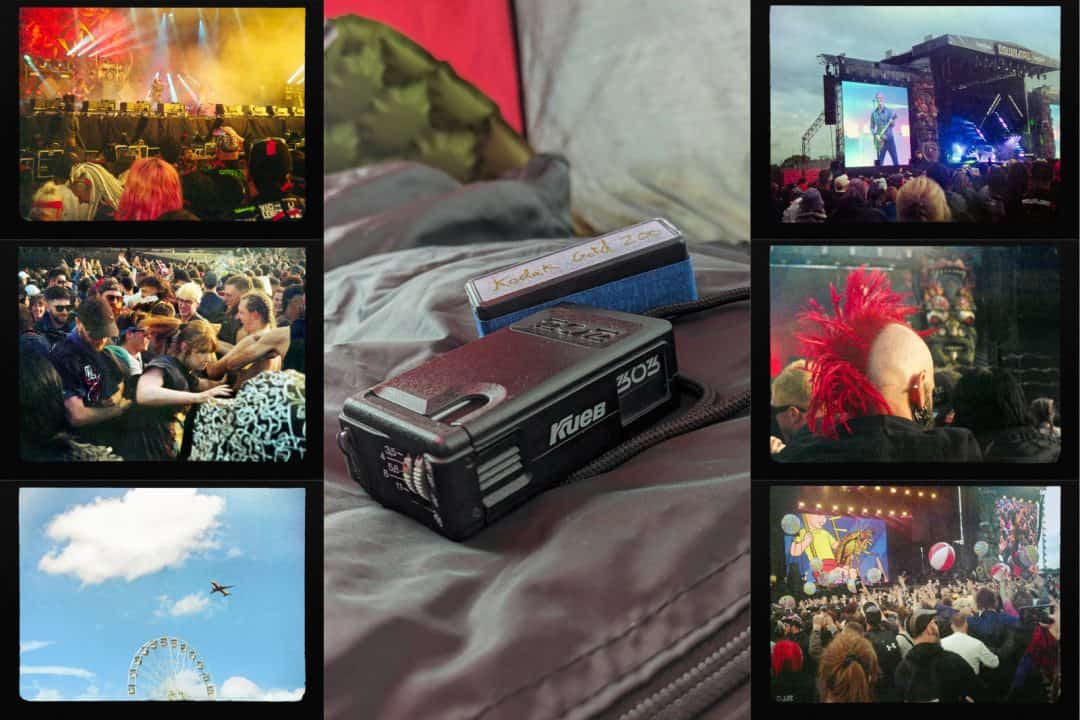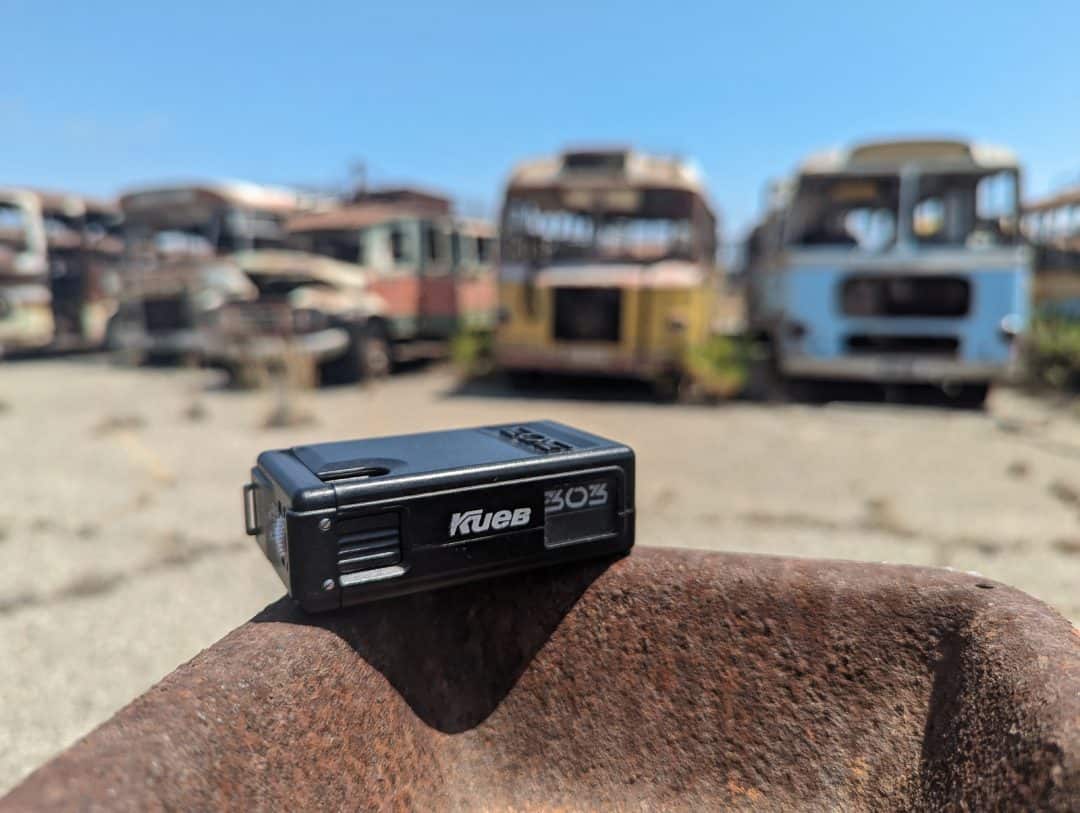Support me on Patreon for early access previews, rewards and giveaways!
Contact Me
Or use the contact form below.
Support me on Patreon for early access previews, rewards and giveaways!
Or use the contact form below.
The legendary Download Festival is a glorious (and this year, gloriously muddy) English institution dedicated to all things metal. I decided to capture this years colourful and energetic event in a unique way – on a vintage 1990s subminiature film camera, made in the Soviet Union. Why? Because my brain told me it would be fun (plot spoiler, it was!).
Rewind a couple of months. The night before I headed off to Download 2024, a thought entered my head as I was packing my camping gear. I wanted to shoot the festival on film, to capture some grainy film memoires of my long weekend moshing out and camping in a field in Donnington, England. Looking at my camera shelf, I didn’t want to take my most beloved camera, grandad’s Zenit-E. Likewise, the other options in my collection didn’t feel suitable due to the risk of damage (looking at you, bellows cameras!) or were simply too bulky.
The solution was, of course, a pocket-friendly and cheap subminiature camera. My tacky-looking Kiev 303 caught my eye, so was scouped up and stuffed in my bag and so this random photo project began!

Fun Fact : this is my second quirky 16mm subminiature camera photo project. I also own a slightly older Kiev 30, which I took on an adventure to Latvia/Lithuania to shoot abandoned Soviet relics in the Baltics. I am certain there will be more special subminiature features in the future (as soon as I reassemble and fix that Minolta MG-S!).
Not interested in reading about clunky old cameras and my battles getting a working copy? Skip straight to the photos from Download 2024 (they are the best part, of course!).

The Kiev 303 (Russian: Киев 303) 16m subminiature camera was manufactured in the Soviet Union in the 1990s. Specifically, in the Arsenal factory in Kyiv, Ukraine.
This tiny camera is exceptionally compact, measuring a mere 84x46x27mm when closed. When opened for shooting, it is 108mm in length. The camera uses 16mm film, housed in film cartridges identical those used in Minolta 16 cameras. Each image captured on this film measures 13x17mm, approximately half the size of a standard 35mm frame.
The Kiev 303 comes equipped with an none-changeable Industar-M 23mm f/3.5 lens (focal length roughly equivalent to a 46mm lens on a 35mm camera, for comparison). Minimum focus distance is 50cm.You adjust the focus using a wheel on top of the camera, this along with the shutter button is only accessible when the camera is open. The camera has a built-in shutter with speeds ranging from 1/250 to 1/30 of a second, and you can adjust the aperture between f/3.5 and f/11.
People often call these 16mm Kiev cameras “spy cameras”, conjuring up mental images of KGB agents skulking in shadows and snapping covert photos. Certainly, their compact size and ability to focus close-up, it’s easy to see why people would link it to secret missions and clandestine document photography.
But was it really a spy camera? While it’s certainly possible, it’s more likely that the Kiev 303 was a simple compact camera aimed at families and amateur photographers. In Cold War USSR these little cameras were more likely to be snapping scenes of everyday life and vacation memories, than being used in espionage.
The internal mechanism is almost identical to that of the 1980s Kiev-30 and 30M, with a couple of minor differences. Firstly a few things are missing in this revision, namely a PC flash socket and the manual exposure calculator wheel. Secondly, the robust metal body of the previous models has been replace by a less appealing plastic casing.
However, there are some changes to the shutter speeds which may make this camera more appealing. Whereas the Kiev 30 has 3 shutter speeds (1/30, 1/60, 1/200), the Kiev 303 has four (1/30, 1/60, 1/125, 1/250) which gives more control over exposure. Also not, the fastest shutter speed is a slightly snappier 1/250 in this version which might be a benefit in sunny locales.
Some other quirks similar to the Kiev 30, that were less of an issue with outdoor festival shooting;

Getting a working Kiev 303 copy was a bit of a mission!
Before even taking a photo, I had taken the precaution of replacing the light seals, thankfully after spend and evening fixing light leaks on my Kiev 30 a few months prior I was well versed. I wasn’t going to be caught out by that again this time! However, hidden inside the plastic body was a fungus-covered lens, resulting in blurry, low-contrast images on the rest roll.
After cleaning it, I noticed the images were still blurry but this time there was clearly an element of movement/shake to blame. Oddly, photos taken at the fastest shutter speed, 1/250, were blurry, while slower speeds were sharp. I had read online somewhere that some medium format USSR cameras had a similar issue, caused by overly aggressive shutter springs causing vibrations.
As luck would have it, I picked up a second Kiev 303 from eBay at a bargain price. While test rolls from this version did not have the highest-speed shutter speed shake issue, it had a new problem: frame spacing was off. All the photos were overlapped by a few milometers. Not ideal on a camera which such tiny negatives!
The solution? A bit of camera surgery. I swapped the winding mechanism from the first camera to the second, fixing the frame spacing without affecting the shutter. Finally, I had a working Kiev 303!
I think the Kiev 303 is really fun camera to use, I had a blast shooting on it during the three-day festival. It fit comfortably in my pocket, ready to be drawn out to snap candid crowd shots and (attempting) to get glimpses of bands on the main stages. I haven’t shot any gigs or festivals before, let alone on film so this was a first for me. I really got into it, and I even the little hand strap to secure it to my wrist while I bouncing about in the pit to Machine Head and The Offspring!
I opted to change film rolls back at my tent in the evenings, in the safe darkness of my film changing bag. The light seals on the 16mm cannisters are not the best, plus I didn’t fancy faffing about changing film in the rainy mud bath of the arena!

Still here? Awesome, you made it to the photos!
I shot two rolls of film with the tiny camera during the festival, hoping to capture a few usable images for this article. I developed the film at home using Patterson tanks and 3D-printed reels for the 16mm footage. In terms of chemicals, I used a Bellini C41 kit (a few rolls passed the end of its recommended usage life, but still delivered great results!). Pulling the still-wet film from the final stabiliser bath is always nerve-wracking, especially for a project like this where there’s no chance for reshoots. To my delight, the tiny film strips held a full-run of negative images with good density!
What photograph caught your eye the most? How did this location make you feel? Do you have a question? Let me know by leaving a comment!
Join My Adventures!
I add new content every week, ranging from exciting new locations to blog articles about my road trips. My beautiful newsletter will bring my photographic adventures direct to your inbox!
Your email address will not be shared, or publically displayed. I will only use your data to send you the newsletter, as outlined in the Privacy Policy. You can unsubscribe at any time, via the opt-out link included in every email.